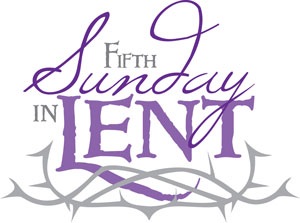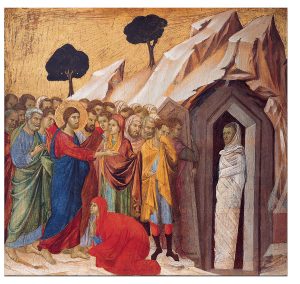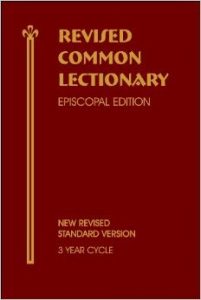
The Collect: Almighty God, you alone can bring into order the unruly will and affections of sinners: Grant your people grace to love what you command and desire what you promise; that, among the swift and varied changes of the world, our hearts may surely there be fixed where true joys are to be found; through Jesus Christ our Lord, who lives and reigns with you and the Holy Spirit, one God, now and for ever. Amen.
Virtual Coffee Hour Zoom Instructions: Mar 22, 2020 10:30 AM
-From a PC, Mac, iPhone, iPad, or Android device, click on https://zoom.us/j/398077843
-The first time you use this, you will need to download a software program, but it is very fast. When prompted, click “Join Audio Conference by Computer.”
-If you want voice only, please dial (312) 626-6799. And enter meeting ID: 398 077 843.
Lectionary: Read the Lessons Here
“What Wondrous Love is This?” American Folk Hymn (arr. Arlen Clarke). Sung by Brad Cresswell with Jane Weber on the organ.
A sermon for the Fifth Sunday in Lent by J. Paul Board
On this Fifth Sunday of Lent, we read how Jesus performs his greatest miracle in Bethany. He brings Lazarus back to life. There are two things I want you to know about this miracle story before I develop my sermon.
 First, this is the miracle that condemned Jesus to the cross. Up to this point in the Gospel, the Pharisees were frustrated with Jesus. They were irritated and annoyed. But they were also engaged. They tried to debate Jesus, correct him, and trick him. They believed they could box him into a trap of words to discredit him.
First, this is the miracle that condemned Jesus to the cross. Up to this point in the Gospel, the Pharisees were frustrated with Jesus. They were irritated and annoyed. But they were also engaged. They tried to debate Jesus, correct him, and trick him. They believed they could box him into a trap of words to discredit him.
Once Jesus raised Lazarus, they wanted Jesus dead. This was the turning point in the Gospel when the Pharisees began plotting to kill Jesus. Their specific complaint was Jesus raised Lazarus on the sabbath, but this was merely a technicality of the Law. The Pharisees needed to eliminate Jesus to maintain their power over the people. They were highly threatened by his healings, his teachings, and now this miracle. It was not the straw that broke the camel’s back. It was a meteor from the sky!
The second point— this miracle is not a clinical story. We don’t know what happened. The text tells us Lazarus was ill, but we don’t know why. Jesus was not in a hurry to visit. When he was ready to travel to Bethany, Jesus declared that Lazarus was asleep. We learn quickly that Lazarus wasn’t sleeping, but dead. He died four days prior to Jesus’ arrival.
Once there, Jesus cried.
Scholars have given a variety of interpretations as to what Jesus meant by sleeping. The text says Jesus was referring to death and confused his disciples with sleep talk. Scholars say Jesus waited for Lazarus to die so he could perform the great miracle. Lazarus needed to die so Jesus could glorify God by “waking him up.” The resuscitation is not explained. There is no CPR. Jesus commands Lazarus to get up and come out of the tomb.
We simply don’t know what happened. This is not a clinical story.
Might Lazarus have died from a virus? It is very possible. The world of Jesus was volatile and life was fragile.
I heard a doctor on the news this week say, “Pandemics are common. They happen throughout human history, just not very often. It’s been so long since our last pandemic, we have forgotten how to cope.” They skip a few generations and when they show up, they wreak havoc on our lives because we don’t remember what to do.
Our world is different now than it was during the Spanish Flu of 1918. It is different than the cholera epidemic of 1854 that wiped out the population of Maumee and Perrysburg. It killed the rector of St. Paul’s and his wife, Mark and Harriet Jukes. They died within 2 days of one another in the rectory, where I live now.
Our world has become dependent on international travel. In previous pandemics, the disease was limited to geographical areas, like whole cities. The hot zones never encompassed the whole globe.
We also have more science. We saw COVID-19 coming in ways our ancestors never could predict. We can debate whether or not we were prepared, but let’s be honest. We knew.
A moment of rant here: I don’t care for celebrities and politicians telling us “we will get through it.” Maybe so. But if anyone close to me dies from this virus, then we DID NOT get through it. The threat is deeply personal to each of us. Yes, it threatens our nation, our economy, and our way of life. But it also threatens each of us personally and profoundly. I don’t want to hear about how we will get through it. I want us to pray so there is no “it.” I don’t want to lose anyone to this disease.
The governor has told us the spike in Ohio will likely be in mid-May. The good news is our mitigation (stay at home) has lowered the curve. The spike is when, according to models from the Cleveland Clinic, Ohio will experience 10,000 new cases of COVID-19 per day. Think about the implication. If the spike is in mid-May, then we still have to go down the back side of the curve. This means it will be July before we get back to the position we are in right now.
The bishop has said it will be a while before we return to worship in our churches. He has not clarified when this will be. No one really knows, but you may anticipate the suspension of worship will last through April and probably longer.
The new normal may not permit us to gather in groups for a long time. We must learn to be the church when we cannot congregate for worship.
My fire chief put it in perspective for me. We were just chatting when he said, “Mother Nature is talking to us.” To be clear, my fire chief is a man of deep faith. He is a Christian. I believe he was purposefully NOT crediting God for COVID-19. God did not bring this virus down on us.
I looked at the chief and waited for an explanation. “Mother Nature is talking to us.” He said two things.
One: We need to slow down.
Two: We are not in charge.
It’s been so long since we have had a pandemic. Remember, these are normal occurrences in human history. It’s been so long we have forgotten how to cope.
We need to slow down.
We are not in charge.
Perhaps our mitigation (stay at home) is a reminder of how to slow down. We have certainly lost control of our lives. We can’t go to church, the movie theater, or a game. We cannot do what we want when we want. But maybe we lost control long before we realized it.
We can pray. We can learn to pray when our lives are still. We can find peace in the stillness and find our way close to God.
The Raising of Lazarus was a turning point in the Gospel. The Pharisees began plotting to kill Jesus. Is COVID-19 a turning point for our lives? Can we “get through it?” Will our lives be different on the other side of the curve? Or back to the same?
We have an opportunity here. We don’t have a building where we can go to church. But we can be the church. We can’t choose anymore between soccer or church on Sunday morning. (Insert golf, baseball, sleeping late, or whatever pulls you away from church on Sunday morning.) But we can choose God.
We can choose God.
We have a whole lot more science to help us with COVID-19. We are in much better shape than in 1918. In 1854, they didn’t even know the cholera was in the water. All they had to do was boil the water, but they didn’t know.
Choosing God isn’t clinical. Jesus cried for his friend. We don’t need to know how Lazarus died or how Jesus raised him. We know that Jesus loved him. The only other time Jesus cried was when he looked upon the Temple on Palm Sunday. Jesus knew the fate of the temple and he cried.
There’s no science needed to love the Lord. When you think about it, choosing God is rather simple. No requirements. No prerequisites. Just love.
Amen.

